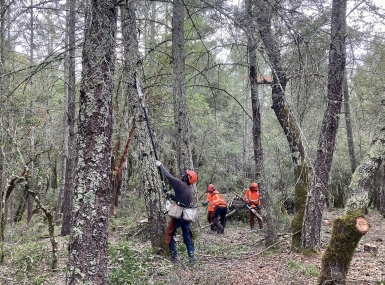House Transportation and Infrastructure Committee advances, House passes key bill with NACo’s support
Author

Brett Mattson

Naomi Freel
Upcoming Events
Related News

Key Takeaways
Update: On December 9, the FEMA Loan Interest Payment Relief Act (H.R. 2672) passed the U.S. House of Representatives.
On September 18, the U.S. House of Representatives Committee on Transportation and Infrastructure held a full committee markup session, voting to advance 29 measures for House floor consideration. Among the legislation approved, three bills that NACo has actively advocated for were approved. These bills address critical issues such as disaster relief, fire management and extreme weather response—each with the potential to significantly benefit counties across the nation. The bills include:
H.R. 2672, FEMA Loan Interest Payment Relief Act
This bipartisan bill aims to provide financial relief to counties and other local entities by clarifying that interest incurred on loans for FEMA-eligible projects is reimbursable.
- Reimburses local governments and electric cooperatives for interest on loans taken out for FEMA-eligible projects.
- Reduces the financial strain on communities recovering from disasters.
- Accelerates recovery by providing clear guidance on FEMA reimbursement policies.
NACo actively worked with a coalition of local government organizations to advance this legislation. NACo sent a letter of support to Congress, advocating for the bill’s passage to reduce the financial burden on counties following disasters. On December 9, the FEMA Loan Interest Payment Relief Act passed the U.S. House of Representatives.
Read NACo’s Letter View H.R. 2672
H.R. 9121, Fire Management Assistance Grants for Tribal Governments Act
This bill enables tribal governments to directly request Fire Management Assistance Grants (FMAGs) from FEMA, making the process for tribes consistent with how they request Public Assistance during emergencies.
- Allows tribal governments to directly apply for FMAGs, streamlining the process for requesting assistance.
- Improves coordination between counties and tribal governments during fire emergencies.
- Ensures resources reach impacted areas more efficiently in the aftermath of wildfires and other emergencies.
NACo has been a vocal supporter of this legislation, highlighting the importance of efficient disaster response. NACo contributed to a press release in support of the bill, emphasizing the vital role counties play in emergency response and recovery, particularly in coordination with tribal governments.
See the Press Release View H.R. 9121
H.R. 9024, Extreme Weather and Heat Response Modernization Act
This bill authorizes FEMA to address extreme heat and cold events under Sections 203 and 404 of the Stafford Act, expanding FEMA's ability to respond to climate-related disasters.
- Expands FEMA’s authority to address extreme weather events like heat waves and cold snaps.
- Establishes an advisory board at FEMA to study the impacts of extreme heat, with two county representatives included.
- Strengthens counties’ ability to adapt to climate challenges and improve resilience.
NACo worked closely with the bill sponsor during the drafting of this bill and successfully secured the inclusion of two county representatives on the proposed FEMA's advisory board. By providing feedback on the legislation, NACo ensured that counties have a direct role in shaping the federal response to extreme weather events.
Impact on counties
The advancement of these three bills represent significant victories for counties, providing vital support in disaster recovery, emergency preparedness and climate resilience. By reducing the financial burden on local governments, streamlining access to resources for tribal partners and addressing the growing threat of extreme weather, counties will be better equipped to protect residents and rebuild after disasters. NACo's role in shaping this legislation ensures that counties remain at the forefront of these important conversations, and their needs are addressed as these bills advance toward full adoption and implementation.
Related News

County Countdown – April 21, 2025
Every other week, NACo's County Countdown reviews top federal policy advocacy items with an eye towards counties and the intergovernmental partnership. This week features the ARPA reporting deadline, a budget reconciliation update and more

U.S. House reintroduces legislation to address the Medicaid Inmate Exclusion Policy
Two bipartisan bills aimed at addressing the Medicaid Inmate Exclusion Policy (MIEP) were recently reintroduced in the U.S. House of Representatives.

FEMA halts disaster mitigation grant program
On April 4, the Federal Emergency Management Agency (FEMA) announced it will not allocate $750 million this year for the Building Resilient Infrastructure and Communities (BRIC) grant program. According to the press release, FEMA will also stop funding BRIC projects that were previously approved and are still underway.